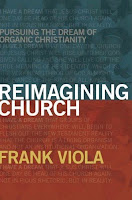"What business are you in?" John Wimber would sometimes ask church leaders (a good question that requires serious thought if it is to be answered intelligently).
Then came his follow up: "How's Business?"
I'll be honest: I used to find those two questions intimidating. I, of course, was in the church business, so to speak. On the surface, that is a "business" consisting of such things as discipleship, evangelism, maturity and care.
The problem came when I tried to evaluate the second question: "how's business?" Were people being discipled in our church? How could I tell? What could we measure? What percentage of the church were "disciples" versus "attenders" (or what have you)? Was "evangelism" taking place? How could we know? Was that a thing to be measured via conversions or conversations? Were the folks in the church maturing? Compared to what? What reliable indications of "maturity" could we point to?
There was one thing I could feel some confidence about: pastoral care. Were people receiving good care? Yes. Not perfectly, not without some lacks and misses, but by and large our people were well cared for and they often told us so. So, the church caregiving business was going well, but most other things we said we were about were tougher to measure with certainty.
Some people may be surprised to learn that Vineyard director John Wimber had an intensely practical side to him -- what the old timers used to call "horse sense". He was, after all, a native of the "Show Me" State (Missouri). Activity was not enough for Wimber. He wanted measureable results. To him, doing all kinds of church things with no means to guage their ultimate effectiveness was sort of like playing a basketball game without hoops, nets or backboards -- lots of activity, yes. But who knew the actual score?
That was the pebble in my shoe throughout much of my pastoral ministry. We were doing "good stuff", preaching good sermons, hearing good testimonies, holding prayer meetings, groups, classes and outreaches -- but the hardcore practical indicators (the so called "nickels and noses" that are counted by pastors and church leaders) lagged. In our last church -- my best years of traditional church experience -- we never broke the "100 barrier" much. Financial red ink became a serious problem. The "ESPs" (empty seat people) eluded our attempts to reach out to them with Alpha Courses, special events and friendship evangelism. Nevertheless, there were many great and unforgetable things about that Body of Believers that changed my life, and the lives of many of the others of us, forever. Did that mean "business was good"? Yes, I suppose it was. But too many of the indicators I expected to measure this by were vague. Like the hoopless basketball player, I could point to the dribbling, the passing and the running but I found myself doubting our ability to win the church growth game we were trying to play.
A year after the bittersweet closure of the Crown Valley Vineyard, I am revisiting Wimber's classic questions and I am surprised to find how differently I relate to them now. Something has most definitely changed since transitioning into our new missional formation. I'm ready for those two questions now -- maybe for the first time in my entire adult ministry life. That's because I now know exactly what "our business" is. It is clear. It is simple. It is for real -- to empower everyday people to take the ministry of Jesus to everyday places. And how's that "business" going? I can tell you it is booming -- not because I hope so but because I observe many tangible activities, alliances, events and testimonies that tell me so. The "players" on our VCMN team are not just dribbling and passsing, they are making baskets as they do things like volunteer at a Birth Choice clinic, go online as a computer missionary with Global Media Outreach, speak at a Stonecroft luncheon, invite neighbors to their home for a house church Easter brunch, put on a neighborhood street fair, or hold a healing prayer night at an Irvine gym. And the most wonderful thing of all is that I am "leading from behind" -- undergirding and supporting their Spirit-inspired efforts rather than trying to push people into "doing the stuff".
I really saw this plainly a few months ago one night as I looked around the room at one of our all together meetings and observed that, to a person, everyone in that room was engaged in some kind of tangible relational ministry to someone they cared about. That tells me "business is good" at last and that feels really, really good.





